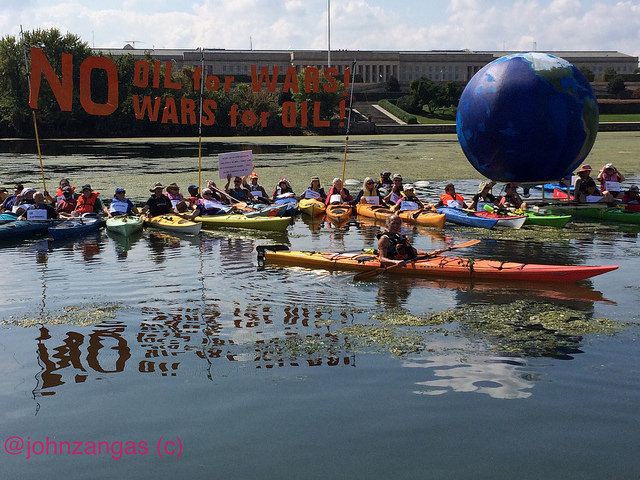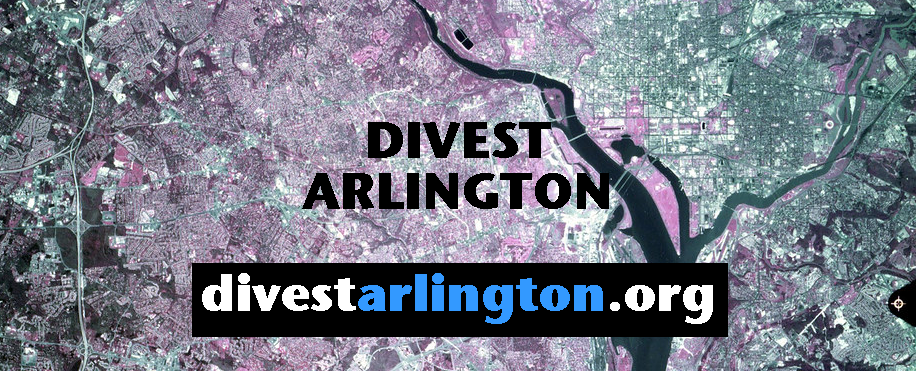We call on Arlington County, Virginia, to divest public funds from weapons and fossil fuels. In the Spring of 2019 we succeeded in moving the City of Charlottesville, Va., to divest from weapons and fossil fuels. Now it’s time for Arlington to follow Charlottesville’s lead.
Contact us to learn more and get involved.
Endorsed by: World BEYOND War, RootsAction.org, CODEPINK, Beyond the Bomb, Busboys and Poets, and International Campaign for the Rohingya.
Click a link to jump down to a section of this page:
Email the County Board and Treasurer.
How this was done in Charlottesville.
The case for divestment in Arlington.
Draft resolution.
Social Media and PSA.
Postcards, Flyers, and Signs.
Images.
Email the County Board and Treasurer:
How this was done in Charlottesville:
In Charlottesville, Va., in the spring of 2019, we organized a coalition of organizations and prominent individuals, including three candidates to City Council subsequently elected in the fall of 2019 after successful completion of the campaign.
We distributed flyers, held public rallies, published op-eds, did local television interviews, collected signatures on a petition, drafted and promoted a resolution, promoted use of a public service announcement, and purchased newspaper and radio advertising.
We spoke at a City Council meeting. We met with the City Treasurer. We spoke at another City Council meeting. See videos of those meetings and other materials at divestcville.org.
We argued for the interlocking inseparability of the two topics of weapons and fossil fuels.
We argued for the broader moral responsibility not to harm the world, and for the long-term financial interest in minimizing climate destruction, and simultaneously for the ability to maximize short-term profits without investments in weapons or fossil fuels.
We argued that Charlottesville had divested from South Africa and Sudan in past years, and therefore was capable of divestment. We need to find out whether Arlington has that history.
Charlottesville, unlike Arlington, has a separate retirement fund that it controls separately from the State of Virginia, but which the City claimed would be difficult to divest from. We compromised by asking for immediate divestment of the City’s operating budget, and divestment in the coming months of the retirement fund.
We pointed out that the citizens had never been asked whether they approved of these investments, and were now speaking up in order to have some democratic say in what was done against their interests with their money.
We pointed out that gun violence had famously come to Charlottsville in 2017.
Arlington County has monthly board meetings, including December 14, 2019, rather than Charlottesville’s two a month. It allows only one speaker per topic, in contrast to Charlottesville. We will have to consider what use to make of Board meetings, and what of other efforts to meet and discuss with the Treasurer and/or Supervisors. As in Charlottesville, we can modify the flyers found below on this page to promote particular events. Additional steps in this campaign will be determined as it progresses.
The case for divestment in Arlington:
The reasons to divest in Arlington are mostly laid out in the draft resolution below. We have learned that Arlington County has some interest in this question and has asked the City of Charlotesville for advice on it. We believe the County should hear from its residents loudly and clearly that they are in favor.
Arlington has a policy on climate that would seem to require divestment from fossil fuels.
Arlington has a certain responsibility and opportunity given the location of the Pentagon and various large weapons dealers. In 2017, World BEYOND War organized a flotilla of kayaks in front of the Pentagon holding banners that read “No wars for oil. No oil for wars.” This campaign is a further effort, among other things, to communicate the connections between war and climate.
Arlington has tens of millions of dollars invested in JP Morgan Chase, Toronto Dominion (TD), Bank of America, Wells Fargo, and Royal Bank of Canada, to take a few examples. These institutions have billions of dollars invested in weapons (Lockheed Martin, Boeing, and General Dynamics, for example), and in fossil fuels (including the Dakota Access Pipeline). Arlington need not necessarily divest from all of these major banks in order to forbid the investment of any of its funds by these banks in fossil fuels or weapons, but may have to divest from those that will not implement such a policy. In other words, Arlington can and should instruct its asset managers to remove its holdings from fossil fuel and weapons companies, and abandon those asset managers that will not.
It is true that some companies build both weapons and other things. For example, Boeing is the second biggest Pentagon contractor and one of the biggest dealers of weaponry to brutal dictatorships around the world, such as Saudi Arabia, even though it is perfectly true that Boeing also makes civilian airplanes. We do not believe Arlington should invest public dollars in such companies.
Cities and counties can do this. Berkeley, Calif., recently passed divestment from weapons. New York City has introduced it, and has passed divestment from fossil fuels, as have other cities (and nations!)
Can localities divest without losing money? Setting aside the dubious morality and legality of such a question, and noting the responsibility of the County government not to endanger the lives of residents by investing in the destruction of a habitable climate and in the proliferation of weapons, the answer to the question is yes. Here is a helpful article. Here’s another.
Can localities do even better than what we are asking for? Of course. There are unlimited ways in which investments can be made less unethical. Further categories of bad investments could be banned. Proactive efforts to invest in the most ethical places could be required and taken. We have no objections to going further, but are asking for what we see as the most important minimum standards.
Aren’t the environment and weapons two different things? Of course, and we have no objection to creating two resolutions instead of one, but we believe that one makes the most sense as it accomplishes the further public good of highlighting the numerous connections between the two areas (as detailed in the resolution below).
Shouldn’t Arlington keep its nose out of important matters? The most common objection to local resolutions on national or global topics, which this could be construed as at a stretch, is that it is not a proper role for a locality. But Arlington has the same responsibility to protect its people’s safety and that of future generations as any other government, large or small. At issue here is the habitability of Arlington.
Even if weapons and climate are considered to be larger national matters, Arlington has an important role to play. U.S. residents are supposed to be directly represented in Congress. Their local and state governments are also supposed to represent them to Congress. A representative in Congress represents over 650,000 people — an impossible task. Most county board members in the United States take an oath of office promising to support the U.S. Constitution. Representing their constituents to higher levels of government is part of how they do that.
Cities, towns, and counties routinely and properly send petitions to Congress for all kinds of requests. This is allowed under Clause 3, Rule XII, Section 819, of the Rules of the House of Representatives. This clause is routinely used to accept petitions from cities, and memorials from states, all across the United States. The same is established in the Jefferson Manual, the rule book for the House originally written by Thomas Jefferson for the Senate.
In 1798, the Virginia State Legislature passed a resolution using the words of Thomas Jefferson condemning federal policies penalizing France. In 1967 a court in California ruled (Farley v. Healey , 67 Cal.2d 325) in favor of citizens’ right to place a referendum on the ballot opposing the Vietnam War, ruling: “As representatives of local communities, board of supervisors and city councils have traditionally made declarations of policy on matters of concern to the community whether or not they had power to effectuate such declarations by binding legislation. Indeed, one of the purposes of a local government is to represent its citizens before the Congress, the Legislature, and administrative agencies in matters over which the local government has no power. Even in matters of foreign policy it is not uncommon for local legislative bodies to make their positions known.”
Abolitionists passed local resolutions against U.S. policies on slavery. The anti-apartheid movement did the same, as did the nuclear freeze movement, the movement against the PATRIOT Act, the movement in favor of the Kyoto Protocol (which includes at least 740 cities), etc. Our democratic republic has a rich tradition of municipal action on national and international issues.
Karen Dolan of Cities for Peace writes: “A prime example of how direct citizen participation through municipal governments has affected both U.S. and world policy is the example of the local divestment campaigns opposing both Apartheid in South Africa and, effectively, the Reagan foreign policy of “constructive engagement” with South Africa. As internal and global pressure was destabilizing the Apartheid government of South Africa, the municipal divestment campaigns in the United States ramped up pressure and helped to push to victory the Comprehensive Anti-Apartheid Act of 1986. This extraordinary accomplishment was achieved despite a Reagan veto and while the Senate was in Republican hands. The pressure felt by national lawmakers from the 14 U.S. states and close to 100 U.S. cities that had divested from South Africa made the critical difference. Within three weeks of the veto override, IBM and General Motors also announced they were withdrawing from South Africa.”
A RESOLUTION SUPPORTING THE DIVESTMENT OF COUNTY OPERATING FUNDS IN ANY COMPANY INVOLVED IN THE PRODUCTION OF FOSSIL FUELS OR THE PRODUCTION OR UPGRADING OF WEAPONS AND WEAPONS SYSTEMS
WHEREAS Arlington County formally declares its opposition to investing County funds in any entities that are involved in the production of fossil fuels or the production or upgrading of weapons and weapons systems, whether conventional or nuclear, and including the manufacture of civilian arms;
and, WHEREAS pursuant to the Virginia Security for Public Deposits Act ( Virginia Code Section 2.2-4400 et seq.), and the Virginia Investment of Public Funds Act (Virginia Code Section 2.2-4500 et seq.), the County Treasurer has sole discretion over the investment of County operating funds;
and, WHEREAS the County Treasurer has a duty to invest all County funds with the primary objectives of safety, liquidity, and yield;
and, WHEREAS the primary investment objectives for operating funds of safety, liquidity, and yield can be achieved while supporting the Board’s opposition to investing County funds in any entity involved in the production of fossil fuels or the production or upgrading of weapons and weapons systems;
and, WHEREAS weapons companies that Arlington County can commit to not investing in produce weapons that have been used in mass shootings in Virginia and which are likely to be used in more mass shootings in the future;
and, WHEREAS on June 20, 2017, Arlington County resolved to track and reduce greenhouse gas emissions and plan for climate adaptation, and on September 21, 2019, Arlington County updated its Community Energy Plan which makes a strong moral and financial case for a shift to sustainable energy and commits Arlington County to wise energy use;
and, WHEREAS U.S. weapons companies supply deadly weapons to numerous brutal dictatorships around the globe;
and, WHEREAS the current federal administration has labeled climate change a hoax, moved to withdraw the U.S. from the global climate accord, attempted to suppress climate science, and worked to intensify the production and use of warming-causing fossil fuels, with the burden therefore falling on city, county, and state governments to assume climate leadership for the sake of their citizens’ wellbeing and the health of local and regional environments;
and, WHEREAS militarism is a major contributor to climate change;
and, WHEREAS continuing on the current course of climate change will cause a global average temperature rise of 4.5ºF by 2050, and cost the global economy $32 trillion dollars;
and, WHEREAS the President of the United States has said that the current U.S. war in Syria is being fought exclusively in order to take Syria’s oil, the consumption of which would do serious damage to the earth’s climate;
and, WHEREAS five-year averages of temperature in Virginia began a significant and steady increase in the early 1970s, rising from 54.6 degrees Fahrenheit then to 56.2 degrees F in 2012, at which rate Virginia will be as hot as South Carolina by 2050 and as northern Florida by 2100;
and, WHEREAS economists at the University of Massachusetts at Amherst have documented that military spending is an economic drain rather than a jobs-creation program, and that investment in other sectors is economically beneficial;
and, WHEREAS satellite readings show water tables dropping worldwide, and more than one in three counties in the United States could face a “high” or “extreme” risk of water shortages due to climate change by the middle of the 21st century, while seven in ten of the more than 3,100 counties could face “some” risk of shortages of fresh water;
and, WHEREAS, wars are often fought with U.S.-made weapons used by both sides (Examples include U.S. wars in Syria, Iraq, Libya, the Iran-Iraq war, the Mexican drug war, World War II, and many others);
and, WHEREAS local government investing in companies producing weapons of war implicitly supports federal war spending on those same companies, many of which depend on the federal government as their primary customer, while a fraction of the same spending could pay for a Green New Deal;
and, WHEREAS heat waves now cause more deaths in the United States than all other weather events (hurricanes, floods, lightning, blizzards, tornados, etc.) combined and dramatically more than all deaths from terrorism, and an estimated 150 people in the United States will die from extreme heat every summer day by 2040, with almost 30,000 heat-related deaths annually;
and, WHEREAS the rate of mass shootings in the United States is the highest anywhere in the developed world, as civilian gun manufacturers continue to reap enormous profits off bloodshed that we do not need to invest our public dollars in;
and, WHEREAS between 1948 and 2006 “extreme precipitation events” increased 25% in Virginia, with negative impacts on agriculture, a trend predicted to continue, and global sea level is projected to rise an average of at least two feet by the end of the century, with rising along the Virginia coast among the most rapid in the world;
and, WHEREAS the danger of nuclear apocalypse is as high as it has ever been;
and, WHEREAS climate change, like gun violence, is a serious threat to the health, safety, and welfare of the people of Arlington, and the American Academy of Pediatrics has warned that climate change poses a threat to human health and safety, with children being uniquely vulnerable, and calls failure to take “prompt, substantive action” an “act of injustice to all children”;
NOW, THEREFORE, BE IT RESOLVED by the Board of Supervisors of Arlington, Virginia that it declares its support and encouragement of any and all persons acting on behalf of County investment activity, to divest all County operating funds from any entity engaged in the production of fossil fuels or the production or upgrading of weapons and weapons systems within 30 days.
Here is a 60-second Public Service Announcement:
Did you know that Arlington County invests our public money in weapons dealers and fossil fuel producers, so that we are — without ever having been asked — paying through our taxes to destroy our climate and proliferate weapons, including to brutal governments around the world and mass shooters in the United States. Other localities, including Charlottesville in 2019, have divested from these destructive industries. This can be done without any increased financial risk. Email the Arlington County Board and Treasurer and learn more at DivestArlington.org. No more using our own money against us! Spread the word: DivestArlington.org.
Print out postcards addressed to the Arlington County Board: PDF.
Print out flyers in black and white for printing on brightly colored paper: PDF, Docx, PNG.
Print out flyers in color for printing on white paper: PDF, Docx, PNG.
Print out signs that say “DIVEST” (useful at meetings and rallies): PDF.
Print out sign-up sheets for meetings, rallies, tabling: PDF, Docx.











